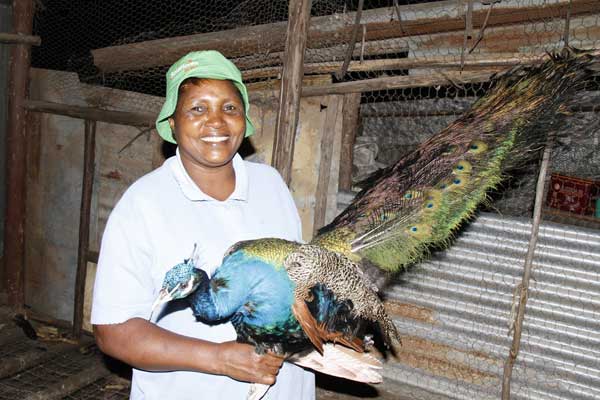The inscription Tausi Farm on the gate in Karen Brooks, Nairobi stares back at any visitor or passer-by who cares to look at it.
From the name, one expects to meet several peacocks on the farm, but Tausi Farm has more than the beautiful birds.
Brown guinea fowls, crown birds, mallard and pelican ducks rush to welcome us as we enter the half-acre farm.
“These are our children,” says Mr Muthamia Murungi, whose family owns the farm.
“They help us welcome visitors. We are a large family.”
DEVELOPED A PASSION
Inside the coops are king pigeons, German parrots, lion pigeons, fantail doves, budgerigars, cockatoos, bantams and Egyptian geese and red geese.
“Those ones stay in the cages. We do not release them since some of them may fly away,” he explains.
Tausi Farm easily fits the description of a birds’ haven. The farm is home to over 10 species of ornamental birds, which Murungi, 28, his father Mr Phinias Muthamia, and other family members rear for sale.
“All my life, I have lived in the midst of birds and developed a passion for them. These birds take care of us just as much as we take care of them,” says the Information Technology graduate.
PEAFOWL EGGS
Initially, father and son were keeping chicken, but they realised the venture was not fetching much money since everybody was doing it.
“We kept chicken for 10 years but the business went down when the market was flooded with eggs. It is then that we thought of doing something different. Since our interests were in birds, we did not want to venture outside the sector, which is why we picked on ornamental birds,” explains Murungi.
That many people love beauty also encouraged them to rear the ornamental birds.
“They plant trees and keep neat hedges but something lacks — birds. We realised there was a market for the birds.”
They started the business by importing 20 peafowl eggs from India. Each egg cost them Sh1,500.
“We brought in the eggs and hatched them in incubators here at home. They were special incubators since the eggs are different from those of chicken,” says Muthamia.
After the birds hatched, they kept them for years to increase the number.
“We started selling the peacocks recently. We brought in the other birds after realising the peacocks were fetching good money.”
With all the four family members working on the farm, their brood has increased since then.
“The cost of rearing ornamental birds is almost similar to chicken, but they are very profitable. A full grown chicken costs Sh1,000 at most in the market but a pheasant, for instance, which occupies less space goes for Sh4,000,” explains Murungi, who adds that different birds have various prices.
WEALTHY CLIENTS
“Furthermore, you can pluck pheasant tail feathers each month and sell them to decorators.”
Demand is huge for the birds both locally and across Africa. The family gets orders from Rwanda, Ethiopia, Uganda, Somalia, Tanzania and Madagascar.
“There is no single day we have received less than five visitors who either want to admire the birds, learn or buy them,” says Muthamia.
SMALLER THAN A FIST
On a bad week, the Muthamias sell a minimum of 10 birds mostly to wealthy individuals, entertainment joints or corporates. They also sell eggs to other farmers or Chinese restaurants, which deal in exotic birds’ products.
Smaller than a man’s fist, the Budgerigar is the cheapest bird you can buy from the farm. The small, long-tailed, seed-eating multi-coloured Australian bird with scalloped markings on the nape, back, and wings, with an ability to mimic human speech costs Sh3,500.
Each of the five blue Indian Peacocks, which gave the farm its name, costs Sh100,000.
Former Vice President Kalonzo Musyoka and former presidential aspirant Raphael Tuju, are among the Muthamia’s customers.
“Besides beauty, the male peacock feathers, which fall off on their own after every breeding season are very popular in weddings. A number of event planners order them,” says Murungi.
The family is keen on increasing the number of mallard ducks, whose eggs they imported from the US, a venture they say is untapped.
QUIT COOKING JOB
“Their feathers are used to make fishing hooks but you need many birds to for such use. However, there is a deficit in the country because manufacturers import them from France at Sh20,000 per kilo,” says Murungi.
The business caters for all the family needs of the Muthamias, as Murungi follows in the footsteps of his father.
In October 2012, Murungi resigned from his work as a computer systems administrator and joined his father in the business.
Muthamia had done a similar thing in 2002 when he quit his job as a cook at Kenyatta National Hospital to keep hens.









